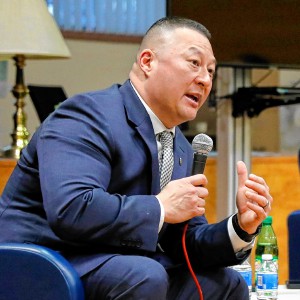For restaurants, card fees are baked in and rising
| Published: 07-26-2023 4:19 PM |
BOSTON — Cash used to be king, but most diners now pay their bill with a credit or debit card, and restaurateurs told lawmakers Monday that the habit is squeezing their already-thin profit margins.
Massachusetts is one of two states that does not allow businesses to add a surcharge to customer purchases in order to cover the cost of credit or debit card processing fees, according to the Massachusetts Restaurant Association. Connecticut is the other state that prohibits businesses from charging a customer a surcharge for using one payment type over another, according to that state’s Department of Consumer Protection.
“When I started in this business more than 25 years ago, credit card usage was only about 20% of the business. It wasn’t a huge overhead expense. Now it’s over 90% of the business. Very few customers choose to pay cash now,” said Douglas Bacon, head of the Red Paint Hospitality Group. “And, in fact, they’re being incented by the credit card companies to get points, cash back and miles.”
Bacon was among those who testified before the Joint Committee on Consumer Protection and Professional Licensure in support of a bill (S 178) that would allow a business to add a fee to consumer purchases to cover the costs of processing payment of credit or debit cards as long as the business informs the customer of the surcharge “by a sign conspicuously posted on the seller’s premises.” The bill was filed by former Sen. Anne Gobi, who resigned in June to become the state’s first director of rural affairs.
“The average small restaurant pays between $20,000 and $50,000 annually to process credit card fees and reports credit card fees as being the third-highest cost they pay for, behind labor and goods,” Jessica Muradian, the Massachusetts Restaurant Association’s director of government affairs, told the committee.
And while Muradian said that restaurants have dealt with credit card processing fees and the way that they eat into profit margins for years, she said the pandemic “has definitely exacerbated the issue.”
Nancy DeFina, the director of human resources and compliance for Niche Hospitality Group, said the seven-location restaurant group based in Worcester pays a fee of between 1.7 and 3.95% of the total transaction price (including taxes and tip), depending on the type of card used, plus an additional fee of 15 cents per swipe to the processing company.
“Every swipe has a cost to it,” she said.
Article continues after...
Yesterday's Most Read Articles
 A Waterfront revival: Two years after buying closed tavern, Holyoke couple set to open new event venue
A Waterfront revival: Two years after buying closed tavern, Holyoke couple set to open new event venue
 Services being held Thursday for Greenfield homicide victim
Services being held Thursday for Greenfield homicide victim
 Island superintendent picked to lead Amherst-Pelham region schools
Island superintendent picked to lead Amherst-Pelham region schools
 Area property deed transfers, May 2
Area property deed transfers, May 2
 Granby Bow and Gun Club says stray bullets that hit homes in Belchertown did not come from its range
Granby Bow and Gun Club says stray bullets that hit homes in Belchertown did not come from its range
 3-unit, 10-bed house in backyard called too much for Amherst historic district
3-unit, 10-bed house in backyard called too much for Amherst historic district
And any transaction that involves a card not physically swiped at the restaurant – like online and phone orders that grew in popularity during the pandemic – is subject to the highest percentage fee.
“Last year, my company spent $505,315 on credit card processing fees alone. In comparing this number to pre-pandemic 2019, we spent $464,438 with 10 locations versus seven [locations] in 2022, which is an 8.09 percent increase with less sales in 2022 versus 2019 and also less locations,” DeFina said. “This year, we have spent $280,550 so far, with 152 days left to go in the year, not to mention [payment card industry] compliance costs to be able to securely accept credit card payments.”
Bacon told lawmakers that the cost of the card processing fees is essentially baked into the prices of dishes on his restaurants’ menus. That means that all customers, regardless of their personal method of payment, end up covering those expenses. If the state were to pass the Gobi bill, he said, “over time menu prices would adjust a little bit. So cash prices would end up being a little bit less and the customer who chooses to use a credit card would pay a convenience fee at the end of the transaction.”
Committee co-chair Rep. Tackey Chan asked Bacon why cash-paying customers could not get a discount now, and the restaurateur said that they can.
“Gas stations in many cases post two different prices on the gas pumps, and I’m sure you’ve noticed this. In restaurants, it becomes nearly unfeasible and impossible to offer two different prices and for us to publish menus with two different prices for a cheeseburger or a beer or a glass of wine for cash or credit, it’s just extremely cumbersome,” he said.
Congress could vote as soon as this week on a bill called the Credit Card Competition Act, which would require the largest credit-card issuing financial institutions in the country to make at least two credit card processing networks available on their cards instead of just one. That could allow merchants to pick a network with lower fees, creating competition in the market.
Peter Brennan, executive director of the New England Convenience Store and Energy Marketers Association, wrote in an op-ed this week that the bill would help stop conglomerates like Visa and Mastercard “from fee-ing consumers and small business owners into financial despair” and called on U.S. Sens. Elizabeth Warren and Ed Markey to “be on the right side for consumers.”
Brennan said that the swipe fees paid by store merchants soared 17% in 2022 to $160 billion nationwide, and cost families on average $1,000 per year. He also noted that credit card companies took in more than $25 billion in net profit last year.
“Our industry is made up of small business owners, many of whom are immigrants, and more than 60 percent who are single store operators. These are not wealthy corporations, they are our neighbors and friends and they’re being squeezed relentlessly by over-regulation and constantly escalating costs of insurance, utilities, taxes and fees,” he wrote. “This legislation is one simple step that Congress can take to throw these entrepreneurs and job creators a lifeline – especially as they face historic inflation – and show consumers that their hard-earned dollars matter.”
Some of those who supported the Gobi bill on Monday pointed out to the committee that while restaurants and other businesses cannot pass credit card processing fees on to their customers, the Mass. Department of Revenue can and does.
“If an operator pays meals tax with a credit card, a 2.35 [percent] convenience fee is added to the transaction,” DeFina said.

 Pro-Palestinian encampment disperses at UMass, but protests continue
Pro-Palestinian encampment disperses at UMass, but protests continue Amherst council confirms Gabriel Ting as police chief
Amherst council confirms Gabriel Ting as police chief Music key to Northampton’s downtown revival: State’s top economic development leader tours city
Music key to Northampton’s downtown revival: State’s top economic development leader tours city 
